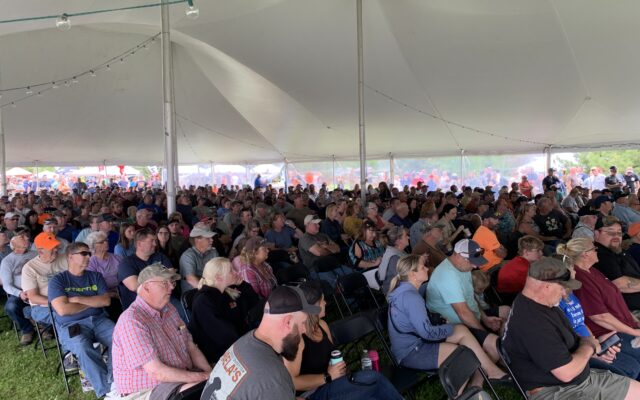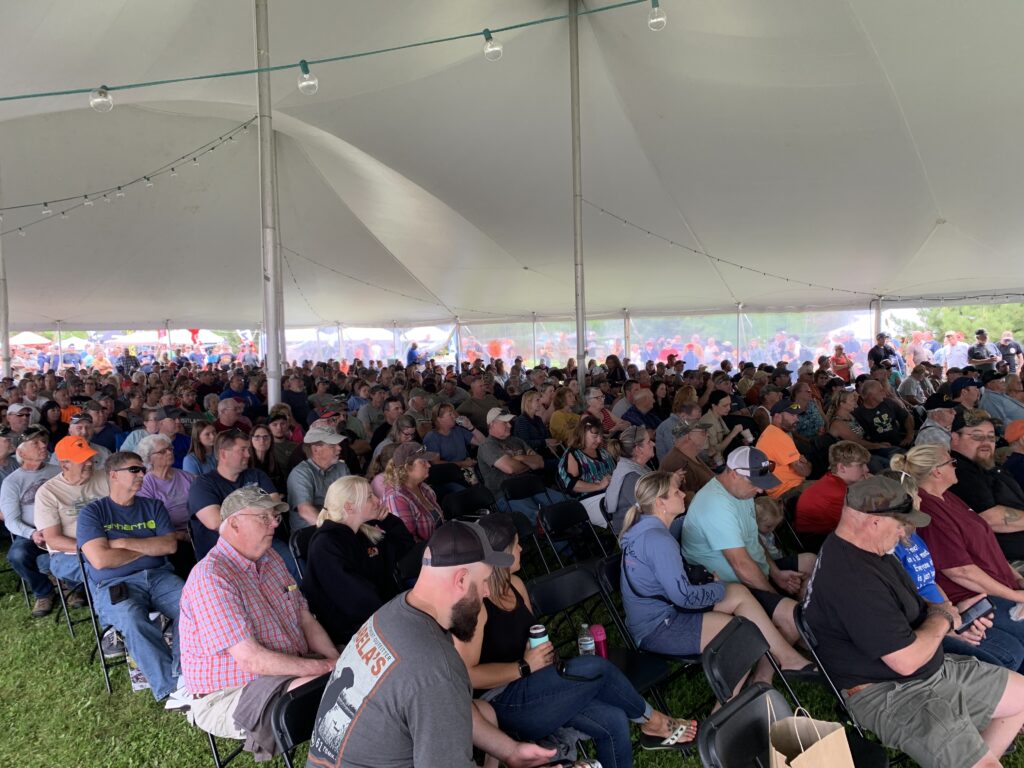
3 things Maine moose hunters should do right now
By Pete Warner, Bangor Daily News Staff
Saturday was an exciting day for the more than 4,000 hunters selected in the annual Maine moose permit lottery.
If you were lucky enough to get a permit, even though the first week of the hunt isn’t until late September, preparations should begin right away.
First-time moose hunters in particular need to make some important decisions, and a few phone calls, to get ready. Checking off these items will make things much easier.
The most important tasks include contacting a Registered Maine Guide if you plan to use one, finding a place to stay during the week and lining up a butcher to process the moose. You also may be interested in swapping your permit before your options are non-existent.

A large crowd gathered under the tent on Saturday in Jackman to hear the announcement of this year’s Maine moose hunt permit lottery winners.
Even though moose hunters in Maine are blessed to have a good population of animals in many areas, that doesn’t mean you can just drive around and expect an animal to be standing there broadside.
When the modern moose hunt began in 1980, large-scale timber cutting in northern, western and eastern Maine meant more opportunities to see animals in huge clearcuts from the road.
However, hunters, guides and local residents in moose hotbeds will tell you that those days are pretty much over — especially in October, when mating activity has subsided. A hunter might sometimes come upon a moose that is visible and accessible from the road, but there are no guarantees.
“It’s totally different now,” said Randy Petrin, a Registered Maine Guide who operates Long Pond Camps and Guide Service in Jackman.
“They’re getting harder to kill. They’re getting more spooky,” he said. “You can’t ride around any more and look for moose.”
Nobody in Maine lays eyes on more moose than DIF&W moose biologist Lee Kantar, who is heading the adaptive hunt in Wildlife Management District 4.
That project hopes to determine whether expanding the harvest in that area — prime moose country — will reduce moose mortality from winter ticks, which have proliferated amid climate change.
“I was up there for nine days over those three weeks of the hunt, drove a lot of miles, talked to a lot of hunters. I drove 600 miles every week and I never saw a single moose,” Kantar said of last October’s adaptive hunt, which was held in an expansive remote area where the moose can remain hidden.
For that reason, hunters can vastly improve their odds by hiring a guide. They know the details of the landscape.
If you plan on doing so, don’t wait. Many of the guides in the top moose hunting areas fill their schedules quickly, so it pays to be proactive.
There is lots of discussion on Facebook pages about guide availability and there also is chatter about swapping permits and locating butchers.
The Maine Professional Guides Association website also includes a listing of guides and the areas where they operate.
“The good guides, within two or three weeks, are booked,” said Registered Maine Guide and lifelong hunter Hal Blood of Big Woods Bucks Outfitters in Jackman. “We guide a lot of Maine people now. It’s just so hard to do it,” he said of the moose hunt.
If you decide not to hire a guide, or if yours doesn’t provide lodging, you’ll also need a place to stay. Lodges, motels, cabins and campgrounds often fill up quickly, especially since many moose hunting areas aren’t close to large towns or cities with lots of lodging options.
Depending upon the WMD in which you’ll be hunting, even putting up a tent or finding a place to park your camper may require a reservation, permission or a fee. Finding out those details now can save headaches when you can least afford them.
The other non negotiable item on a moose hunter’s to-do list is to find a reputable butcher to process, package and freeze the hundreds of pounds of meat you’ll be taking home.
Making a reservation with a meat cutter now means you won’t be driving around rural Maine, in warm weather, searching for a place to have your moose processed.
Time is of the essence once a moose is shot, because it doesn’t take long for meat to begin to spoil. And getting the animal to the truck or trailer alone can take several hours, depending upon the distance and the terrain.
Simply put, the faster and more efficiently you can get the moose to the processor, the better the odds you’re going to wind up with lots of great tasting meat.